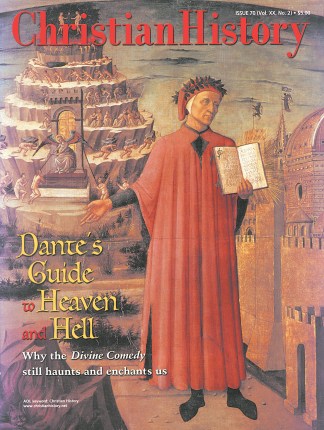First, most anthologies print big hunks of Inferno and then abruptly cut the poem off or zoom straight to the end of Paradiso. This treatment suggests that Dante’s journey through the afterlife climaxes with his vision of Satan. Wrong. If you imagine Dante’s pilgrimage as a road trip on Route 66, Cocytus would be Oklahoma City—a significant stop at the one-third mark, but a long way from the desired destination. (Note: No further parallels are implied between Oklahoma’s fine capital and Dante’s hellish lake of ice.)
Second, anthologies give inordinate attention to footnotes, riddling the poetry with superscripts and piling lines of explanatory text at the bottom of every page. Readers need some information on the many people, places, and events Dante mentions, because otherwise the poet’s points would be entirely lost. But overemphasis on names and dates causes the Comedy to read more like an old newspaper than like an artistic masterpiece. Returning to the Route 66 analogy, footnote freaks are the well-meaning parents who stop at every historical marker along the road. Educational, yes, but also extremely jarring.
Perhaps the biggest mistake made by many teachers and anthologists, though, is believing that a small dose of Divine Comedy will produce lasting benefits for their pedagogical patients. More often, the dose inoculates students against ever wanting to see the poem again.
We assume most of you dutifully received your Dante vaccinations, but we hope that the ill effects have worn off and you are ready to give the poet another try. He has so much to offer—adventure, romance, humor, reflection, and the most engaging expression of the medieval Christian worldview available.
The Comedy cannot be taught or appreciated on a syllabus schedule, because savoring it is a lifetime project. As twentieth-century poet T. S. Eliot wrote, “The majority of poems one outgrows and outlives, as one outgrows and outlives the majority of human passions. But Dante’s is one of those one can only just hope to grow up to at the end of life.”
Yet even a little taste of the Comedy, as we hope to offer in this issue, yields rewards. In the words of C. S. Lewis, “There is so much besides poetry in Dante that anyone but a fool can enjoy him in some way or another.”
Copyright © 2001 by the author or Christianity Today/Christian History magazine. Click here for reprint information on Christian History.










